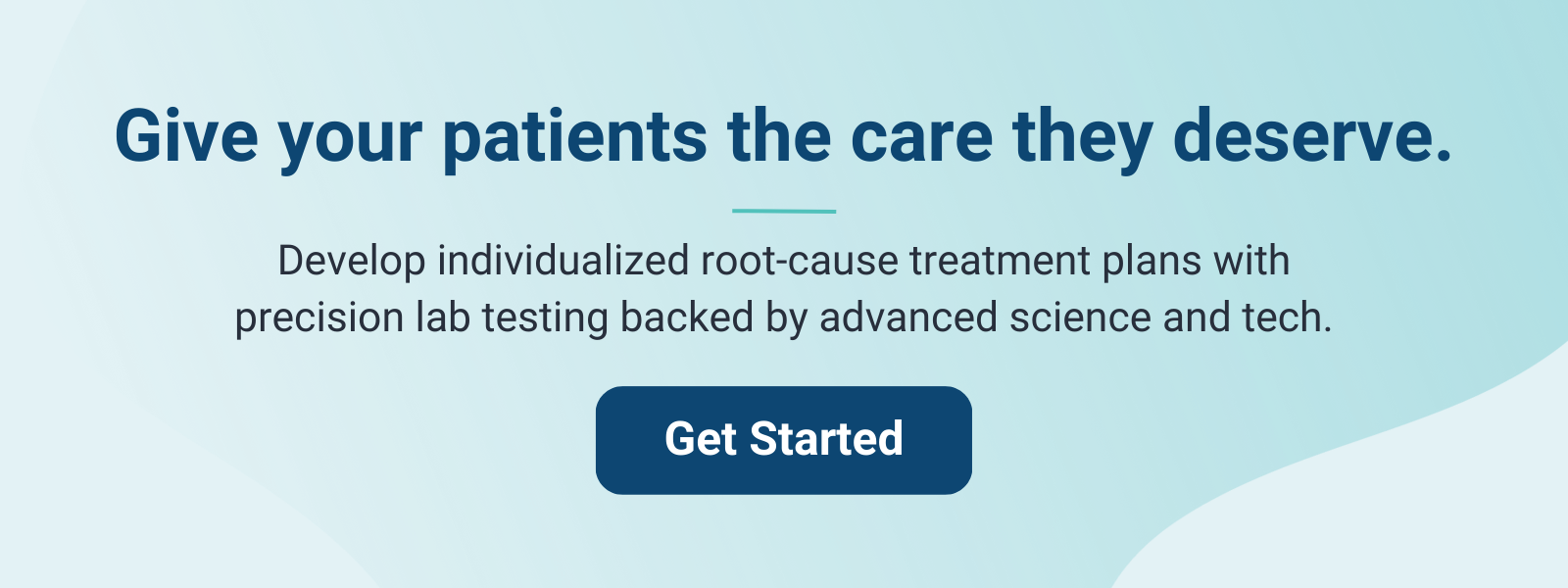The Hidden Role of the Oral Microbiome on Overall Health
Clinically reviewed by Adair Anderson, MS, RDN, LDN
The oral microbiome, a complex community of microorganisms in the oral cavity, plays a significant role in both oral and systemic health. This intricate ecosystem of bacteria, fungi, viruses, and protozoa interacts with the body in ways that profoundly affect overall well-being.
This article discusses the composition and function of the oral microbiome, its impact on overall health, the connection between oral and systemic diseases, and how advanced oral microbiome testing can aid in early disease detection, tailored treatments, and ongoing health monitoring.
Table of Contents
Understanding the Oral Microbiome
The oral microbiome is a diverse ecosystem with significant health implications. To fully grasp its significance, we need to explore its composition, function, and how it interacts with the human body.

Composition and Function
The oral microbiome comprises over 700 species of microorganisms that inhabit various niches within the mouth, such as the tongue, teeth, gums, and saliva. These microorganisms form biofilms and complex communities that facilitate a number of physiological functions.
Digestion
Salivary bacteria break down food particles, aiding in digestion. These microorganisms produce enzymes that pre-digest carbohydrates and proteins, facilitating the digestive process. Additionally, some bacteria in the oral cavity can metabolize certain compounds, contributing to overall nutrient absorption.
Immune Response
The microbiome contributes to immune defense by preventing the colonization of pathogenic organisms. Beneficial bacteria compete with harmful pathogens for space and nutrients, creating a protective barrier. They also produce antimicrobial peptides that inhibit the growth of potential invaders, thus playing a pivotal role in maintaining oral health.
A recent study highlighted the impact of the oral microbiome on immune function, showing that probiotics like Weissella cibaria CMS1 can enhance immune response by increasing salivary immunoglobulin A and decreasing inflammatory markers such as TNF-α.
Nutrient Synthesis
 Certain bacteria synthesize essential nutrients and vitamins that benefit the body. For instance, some oral bacteria can produce vitamin K, a vital nutrient for blood clotting and bone health. These microorganisms also participate in synthesizing short-chain fatty acids, which have several health benefits, including anti-inflammatory properties.
Certain bacteria synthesize essential nutrients and vitamins that benefit the body. For instance, some oral bacteria can produce vitamin K, a vital nutrient for blood clotting and bone health. These microorganisms also participate in synthesizing short-chain fatty acids, which have several health benefits, including anti-inflammatory properties.
The Oral-Systemic Health Connection
The impact of the oral microbiome extends beyond the mouth, influencing systemic health through numerous mechanisms. Understanding these connections can help us recognize the importance of maintaining oral health for overall well-being.
Cardiovascular Diseases and Oral Health
The relationship between oral health and cardiovascular diseases is well-documented. Pathogenic bacteria from periodontal infections can enter the bloodstream, leading to systemic inflammation and contributing to conditions such as atherosclerosis, endocarditis, and myocardial infarction.

Additionally, the systemic inflammation caused by these oral pathogens can exacerbate existing cardiovascular conditions. For example, Porphyromonas gingivalis and other periodontal bacteria in the bloodstream can promote the formation of arterial plaques, increasing the risk of atherosclerosis. This inflammation can also contribute to the rupture of these plaques, potentially leading to heart attacks or strokes. Therefore, promptly addressing oral microbiome issues is essential to cardiovascular disease prevention and management.
Diabetes Mellitus and Oral Health
Periodontal diseases and diabetes mellitus share a bidirectional relationship. Poor glycemic control in people with diabetes exacerbates periodontal conditions, while severe periodontal disease can impair glycemic control, creating a vicious cycle.
Periodontal disease-induced inflammation can increase insulin resistance, making it more challenging to manage blood sugar levels. Elevated blood sugar levels can, in turn, promote the growth of pathogenic bacteria in the oral cavity, such as Porphyromonas gingivalis and Prevotella intermedia, further worsening periodontal health. This reciprocal relationship underscores the importance of managing oral health and diabetes simultaneously.
Inflammatory Response and Oral Health
The inflammatory response triggered by periodontal diseases can impact overall health in people with diabetes. Chronic inflammation can lead to complications such as cardiovascular diseases, kidney problems, and nerve damage. Maintaining optimal oral health can reduce the risk of these complications.
When periodontal pathogens persist in the oral cavity, such as Treponema denticola and Tannerella forsythia, they can cause continuous low-grade inflammation. This systemic inflammation exacerbates insulin resistance, further complicating blood sugar management in diabetics. Over time, the persistent inflammatory state can contribute to the development and progression of serious complications, including diabetic nephropathy (kidney damage), neuropathy (nerve damage), and an increased risk of heart disease. Effective oral health management through oral microbiome testing and targeted treatment protocols can help break this cycle of inflammation.
The Science Behind Oral Microbiome Tests
Oral microbiome testing involves collecting and analyzing saliva samples to identify the composition and abundance of microbial species. The Vibrant Oral Zoomer provides a comprehensive analysis of the oral microbiome by zooming in on microorganisms that are critical components of oral health.
Sample Collection and Interpretation
 The Oral Zoomer is a simple, non-invasive saliva test that patients can collect at home. Once collected, our lab team processes these samples to extract microbial DNA for further analysis.
The Oral Zoomer is a simple, non-invasive saliva test that patients can collect at home. Once collected, our lab team processes these samples to extract microbial DNA for further analysis.
The Oral Zoomer leverages Real-Time Polymerase Chain Reaction (RT-PCR) technology to ensure highly sensitive and specific results. RT-PCR is a cornerstone of genetic testing and pathogen detection, renowned for its ability to amplify specific DNA segments rapidly and accurately.
The panel reveals valuable insights into the presence of pathogenic bacteria, microbial diversity, and potential health risks so healthcare professionals can develop personalized treatment and preventive strategies tailored to specific microbial imbalances.
Clinical Applications of Oral Microbiome Testing
Oral microbiome testing has several clinical applications that can significantly impact oral and systemic health.
Early Detection of Oral & Systemic Diseases
Oral microbiome testing offers significant potential for the early diagnosis and management of various oral and systemic diseases. By identifying pathogenic bacteria and other microorganisms associated with specific conditions, you can implement timely and targeted interventions to prevent disease progression and improve patient outcomes.
In addition to a range of oral diseases, such as dental caries and oral cancers, pathogenic bacteria are linked to several systemic diseases that extend beyond the oral cavity.

For instance, Porphyromonas gingivalis and Fusobacterium nucleatum—both commonly associated with periodontal disease—have been linked to an increased risk of cardiovascular conditions such as atherosclerosis and endocarditis. Additionally, Campylobacter rectus and Prevotella intermedia, which are markers for periodontal disease, have been associated with adverse pregnancy outcomes and complications in diabetic patients.
Tailored Antimicrobial Therapies
Oral microbiome testing allows for personalized antimicrobial therapies based on an individual's specific microbial profile.
This approach targets harmful bacteria while preserving beneficial microorganisms, minimizing the risk of antibiotic resistance and improving treatment outcomes.
The Oral Zoomer provides detailed insights into the presence and abundance of specific pathogenic and commensal microorganisms in the oral cavity, allowing clinicians to design precise antimicrobial strategies to combat these harmful bacteria without disrupting the entire microbial ecosystem.
For example, if oral microbiome testing indicates a high abundance of Candida albicans, targeted antifungal treatments may help reduce the yeast population. Similarly, high levels of Streptococcus mutans, which are linked to dental caries, can inform specific antibacterial therapies and preventive measures, such as fluoride treatments and dietary modifications, to control the growth of this cariogenic bacterium.
Moreover, testing can reveal the presence of beneficial bacteria, such as Lactobacillus acidophilus and Bifidobacterium adolescentis, which play a crucial role in maintaining oral health. Tailored antimicrobial therapies promote a balanced oral microbiome by preserving beneficial microorganisms while targeting pathogenic species, enhancing the overall effectiveness of treatment.
Systemic Health Monitoring
The Oral Zoomer can help monitor the impact of systemic health conditions on the oral microbiome. For instance, patients with diabetes often exhibit changes in their oral microbiome, such as increased levels of Prevotella intermedia.

Tracking these microbial shifts allows you to more effectively manage the oral health of diabetic patients and adjust treatments to mitigate the impact of systemic conditions.
Moreover, monitoring with the Oral Zoomer provides insights into the effectiveness of interventions to reduce inflammation and promote oral health. For example, a decrease in inflammatory markers like Eubacterium saphenum and Eubacterium timidum can indicate the success of anti-inflammatory therapies and lifestyle modifications. This information helps fine-tune treatment strategies to sustain oral health improvements.
The Bottom Line
The oral microbiome is an often overlooked but powerful component of overall health. The Oral Zoomer test equips you with the insights needed to detect imbalances early, tailor treatments, and monitor long-term health, ultimately supporting better patient outcomes.
Regulatory Statement:
The general wellness test intended uses relate to sustaining or offering general improvement to functions associated with a general state of health while making reference to diseases or conditions. This test has been laboratory developed and its performance characteristics determined by Vibrant America LLC and Vibrant Genomics, a CLIA-certified and CAP-accredited laboratory performing the test. The lab tests referenced have not been cleared or approved by the U.S. Food and Drug Administration (FDA). Although FDA does not currently clear or approve laboratory-developed tests in the U.S., certification of the laboratory is required under CLIA to ensure the quality and validity of the test By
By



